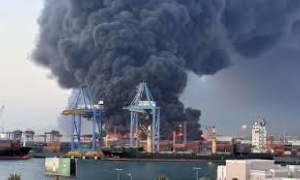Africa News of Thursday, 15 May 2025
Source: www.ghanawebbers.com
Drone attacks raise stakes in new phase of Sudan's civil war
Paramilitary fighters have opened a new phase in Sudan's civil war. This follows their removal from the capital, Khartoum. Experts describe this as a "shock and awe campaign."
Weeks after the army regained control of Khartoum, the Rapid Support Forces (RSF) launched drone strikes on Port Sudan. These attacks have caused power blackouts and water shortages for city residents.
Alan Boswell, an expert at the International Crisis Group, noted this is unprecedented power projection in the region. He believes it raises the stakes significantly.
The RSF's attacks on Port Sudan show they can continue fighting despite losing territory. This also highlights the rise of advanced drone warfare in Africa.
Drones have become increasingly important in this conflict, now entering its third year. The war began as a struggle between the Sudanese Armed Forces (SAF) and RSF. It has since involved other armed groups and foreign backers, creating what the UN calls a humanitarian crisis.
Earlier this year, drones helped the army advance. As RSF was pushed out of central Sudan, they increased their drone use. Recently, they targeted civilian infrastructure in army-controlled areas.
On Wednesday night, RSF attacked three power stations in Omdurman. This caused widespread electricity outages in Khartoum.
The sustained strikes on Port Sudan indicate a shift to remote warfare strategy. Kholood Khair, a political analyst, explained that RSF aims to show they can impact Port Sudan without land access.
She added that RSF wants to change perceptions about SAF's control over Khartoum and Port Sudan. They aim to create an ungovernable security crisis for SAF.
The paramilitary group has not directly commented on these drone attacks but accused SAF of targeting civilians and committing war crimes. Both sides face accusations of war crimes but deny them; however, RSF faces allegations of mass rape and genocide.
The change in tactics may stem from battlefield needs but also reflects technological advancements. Previously, RSF used suicide drones designed to crash into targets for coordinated attacks.
In Port Sudan, they deployed 11 Kamikaze drones against a military airbase. The army shot some down; however, one strategic drone successfully struck its target.
The exact model of this drone remains unclear. Satellite images show advanced UAVs at an airport in South Darfur since early this year.
Defense intelligence company Janes suggests these are likely sophisticated Chinese CH-95s capable of long-range strikes. Jeremy Binnie from Jane's noted that remnants of smaller kamikaze drones appear different from previous models used by RSF.
One observer suggested that signal jammers might help RSF breach SAF’s anti-drone technology; however, this remains unproven.
The South Darfur airport has faced repeated bombings by SAF recently destroying an aircraft there earlier this month. Some experts view RSF's bombardment of Port Sudan as retaliation for these attacks.
Escalating drone warfare highlights foreign involvement in Sudan’s civil conflict. Justin Lynch from Conflict Insights Group stated that technology plays a crucial role here.
He emphasized that foreign supporters are vital because RSF does not manufacture weapons themselves; they receive them instead. The army accused the UAE of supplying drones to paramilitary fighters and cut diplomatic ties with Abu Dhabi due to these attacks.
The UAE strongly denies these allegations and has rejected claims made by UN experts and international organizations regarding weapon supplies to RSF.
Lynch argues evidence overwhelmingly supports claims about UAE assistance with arms deliveries for Port Sudan attacks.
He also believes Iran supplies weapons to SAF while Turkish officials deny any involvement with arms sales to the army.
Both sides' increasing use of drones may redefine their conflict dynamics but it's RSF's ability to strike far-off targets that's alarming regional observers.
Over a week-long series of daily strikes on Port Sudan included hits on critical infrastructure like airports and fuel depots aimed at disrupting army supply lines.
Port Sudan serves as a key entry point for relief supplies; thus UN warns that escalating violence could complicate aid operations further leading to civilian casualties.
Boswell described these actions as shocking enough to stun both SAF and regional allies like Egypt and Saudi Arabia while changing perceptions about air power balance between factions.
He noted that traditionally non-state actors lack aerial capabilities compared to government forces but recent developments challenge those assumptions.
This situation draws comparisons with long-range drone warfare seen between Russia and Ukraine where precision becomes more affordable than manned aircraft operations.
Sudan’s foreign ministry warned these attacks threaten regional security calling for international action against militia sponsors referring specifically to UAE involvement.
Lynch believes only an agreement between UAE and Sudanese army can end ongoing conflicts stating “this war is always evolving.” He predicts it will persist unless serious diplomatic efforts are made towards resolution."











